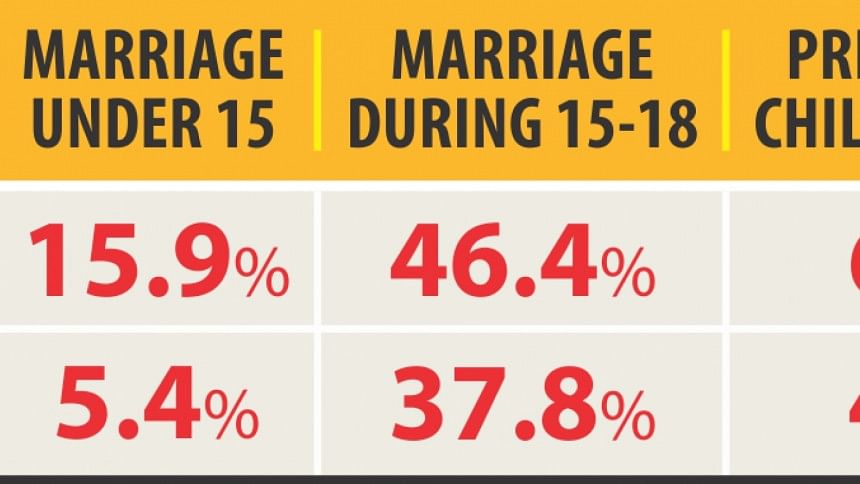Child marriage declines

Child marriage in Bangladesh has come down to around 43 per cent from 62.3 per cent in the last two decades, finds a new research by the Washington-based think tank International Food Policy Research Institute.
IFPRI, however, notes that there is no room for complacency as the rate of marriage between 15 and 18 (minimum marriage age for girls) is still high at nearly 38 per cent while the marriages of girls under 15 have declined remarkably.
The biggest decline in marriage from 1996-2005 to 2006-2015 happened in the cases of girls under 15 but in cases of girls getting married between 15 and 18, the decrease is not that great.
The IFPRI findings come at a time when the government endorsed a draft law yesterday prohibiting marriages of girls under 18 but keeping a provision of relaxing the age bar in “special cases”. The move has caught flak from women and rights' bodies.
Talking to The Daily Star, Akhter Ahmed, IFPRI country representative in Bangladesh and also one of the three authors of the research note -- Is the end of early marriage in sight? -- said in principle, he does not consider it a good idea to keep any “special cases” option as he fears that the provision is likely to be misused.
"Bangladesh's enabling policy environment and national commitment have brought about dramatic improvements in nutrition, food security, poverty, and women's empowerment. However, early child marriage still presents unique social, economic, and political challenges that stifle development progress in Bangladesh," observes the research note.
At the request of the Governance Innovation Unit of the Prime Minister's Office (PMO), IFPRI prepared the research note using IFPRI's Bangladesh Integrated Household Survey (BIHS) conducted in 2015. IFPRI submitted the research work to PMO on November 20.
BIHS is one of the most exhaustive, nationally representative household survey covering 6,500 households across all the seven administrative divisions of the country: Dhaka, Chittagong, Barisal, Khulna, Rajshahi, Rangpur, and Sylhet.
Akhter Ahmed told The Daily Star that the trend shows Bangladesh is on track in eliminating marriages of girls below 15 but more efforts are required to significantly reduce the still high rate of child marriages in the age group of 15-18.
Akhter attributed the drops achieved so far in child marriages to, among others, rising levels of income and education but was quick to add that to make further rapid inroads into this field, vigorous campaigns are needed against the menaces of dowry and social insecurity.
He particularly expressed his worry over 60 per cent of the teenage mothers who are becoming pregnant and said that's why "we're seeing a very slow rate reduction in child stunting."
The IFPRI research note observes, "Young married girls are more likely to drop out of school and, consequently, miss opportunities in gainful employment later in life. Teenage pregnancy -- before the age of physical maturity-- increases the risk of birth complications and giving birth to a low-birth-weight baby, which is closely linked to child stunting."
It also notes, "The power imbalance between young brides and their husbands make girls more susceptible to domestic violence and other risks. Overall, early marriage keeps young brides and their children from reaching their full physical, economic, and social potential."
To improve nutrition for the most vulnerable, especially mothers and children and to address various complementary human development goals, it is essential to break the intergenerational cycle of early child marriage, added the IFPRI study.

 For all latest news, follow The Daily Star's Google News channel.
For all latest news, follow The Daily Star's Google News channel. 



Comments